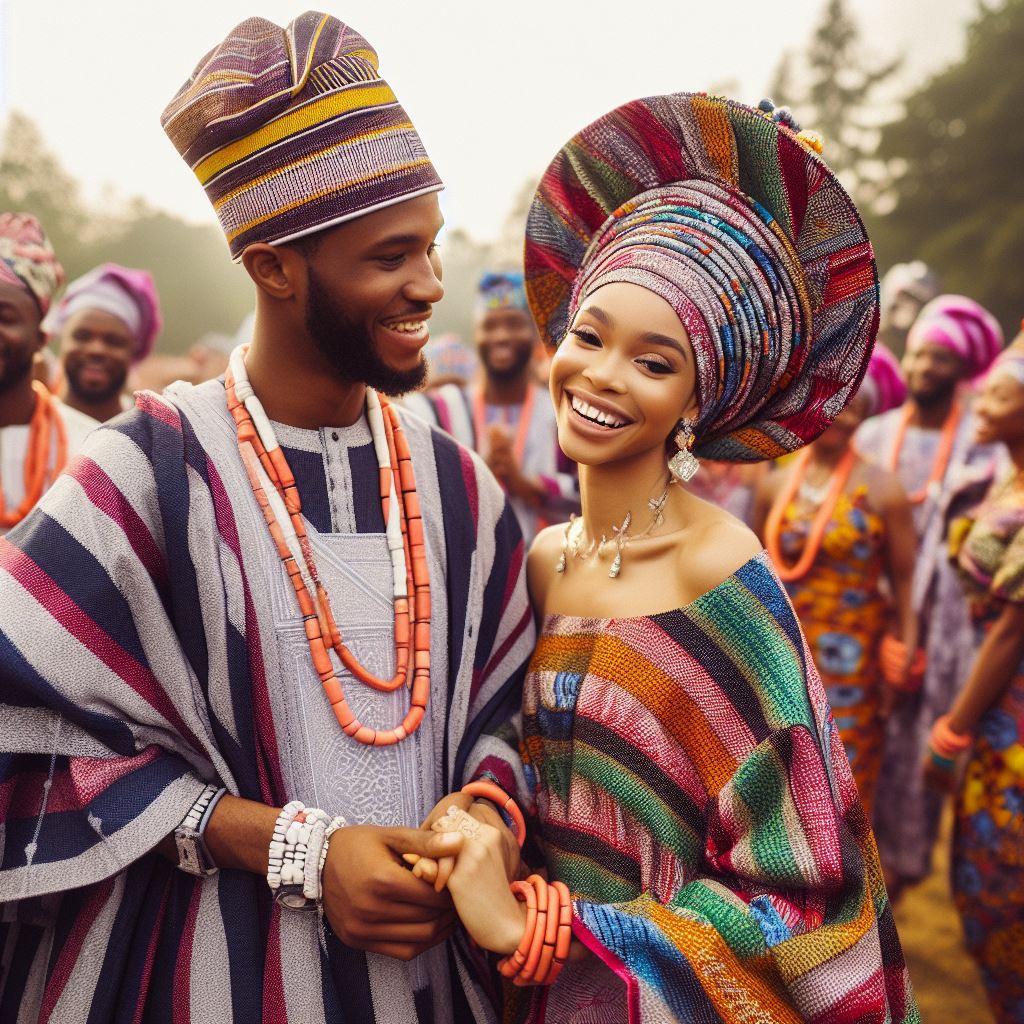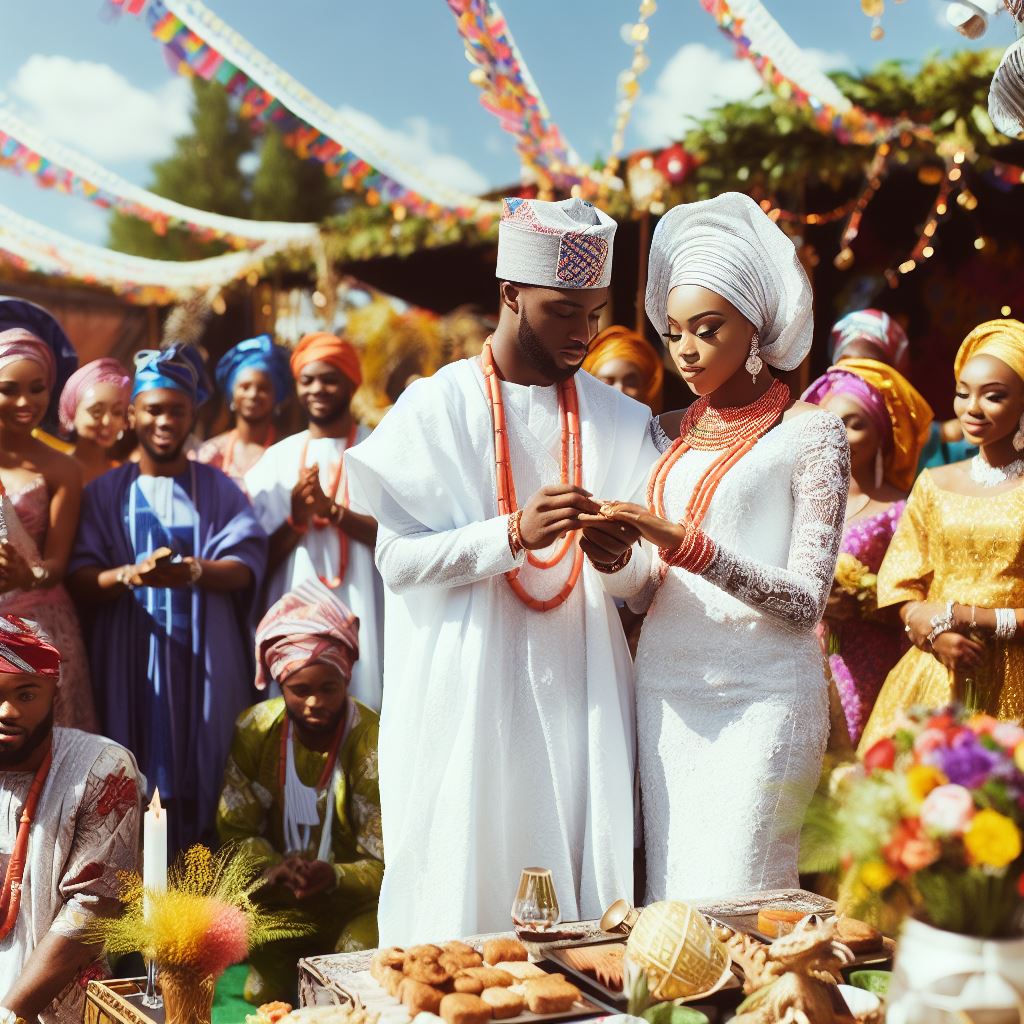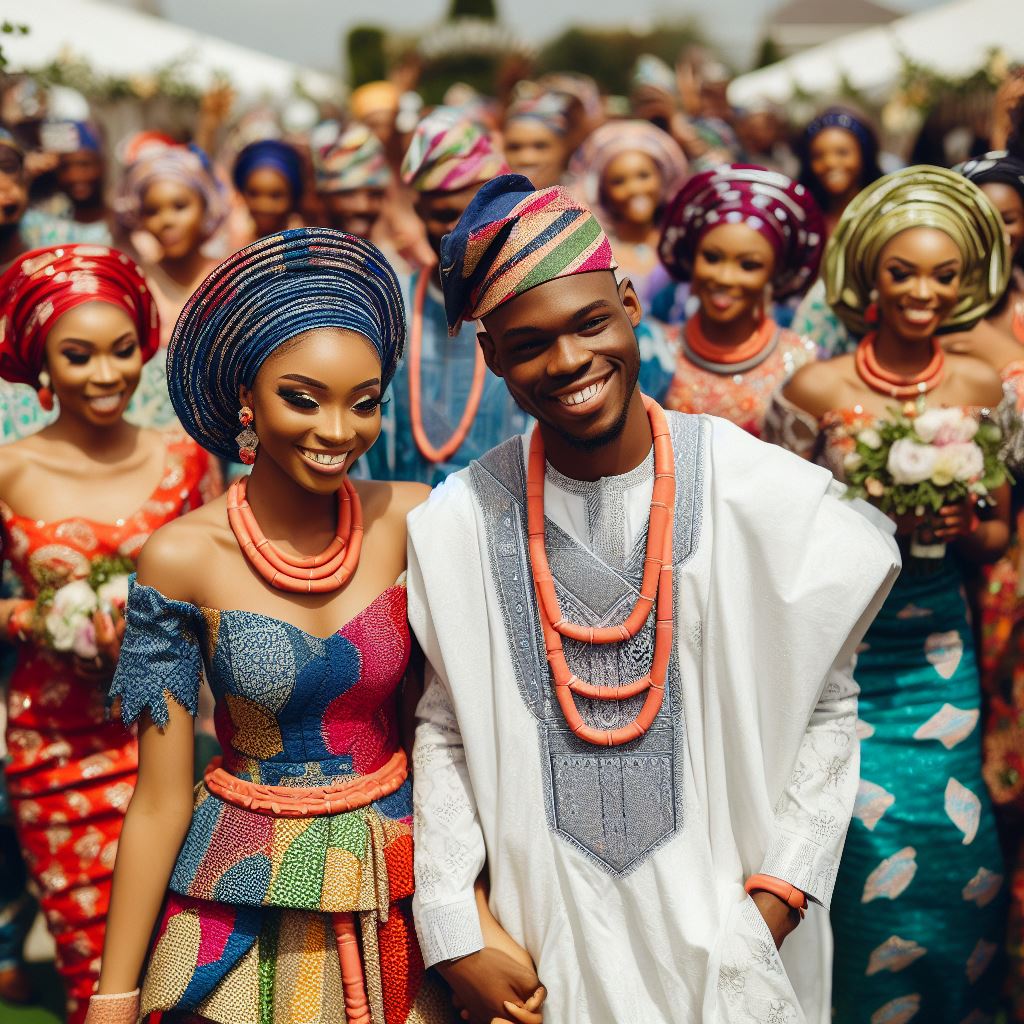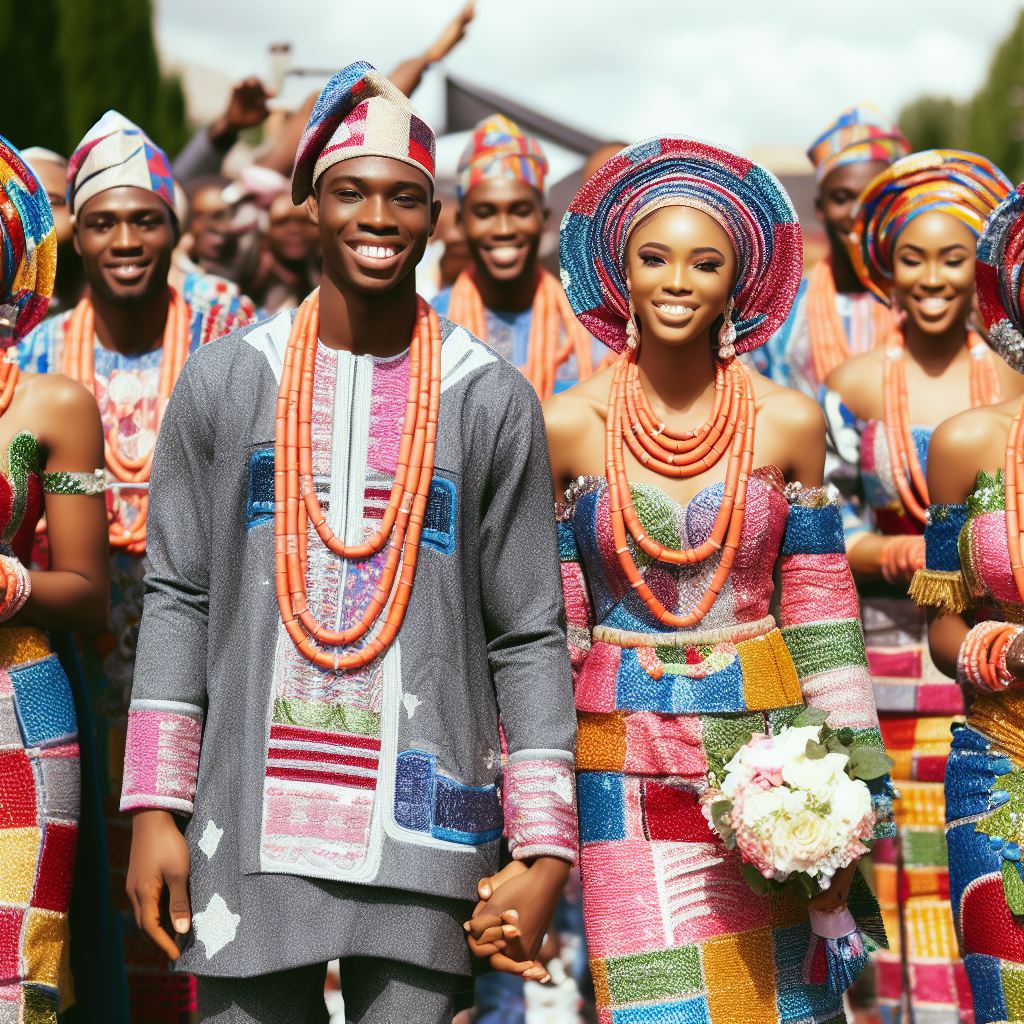Introduction
Marriage traditions in Nigeria, with their deep-rooted history and diverse customs, form a captivating tapestry of cultural significance.
At the core of Nigerian society, marriage is a cherished institution that not only unites individuals but also brings families and communities together.
This section embarks on an exploration of the intricate journey of traditional marriage customs in Nigeria.
It is a journey marked by significant transformation, sculpted by the enduring forces of culture, society, and economics.
We will unravel the evolution of these customs and their role in shaping Nigerian identity, as they adapt and respond to the ever-changing landscape of the nation.
Through this exploration, we will gain a profound understanding of how these customs have been influenced by historical events, societal shifts, and economic realities.
Ultimately shaping the way Nigerians perceive and celebrate marriage today.
Precolonial Marriage Traditions
Arranged marriages
Arranged marriages were common in precolonial Nigeria, where parents played a significant role in selecting spouses for their children.
Bride price and dowry
Marriage involved the payment of a bride price from the groom’s family to the bride’s family, symbolizing the man’s commitment and ability to support his wife.
Polygamy and the role of women
Polygamy was widely practiced, allowing men to have multiple wives, which often resulted in competition and jealousy among women.
Women were expected to be obedient and submissive to their husbands, and their primary role was to bear children and maintain the household.
Rituals and ceremonies
Marriage rituals and ceremonies were an integral part of precolonial Nigerian societies, symbolizing the union of two families and communities.
Traditional rites such as the exchange of gifts, dances, and feasts were conducted to bless the union and ensure fertility and prosperity for the newlyweds.
precolonial Nigeria had a rich and diverse set of marriage traditions that revolved around arranged marriages, the payment of bride price and dowry, polygamy, and elaborate rituals.
These customs shaped the roles of individuals within marriages and reflected the values and beliefs of Nigerian societies at the time.
Read: Legal Requirements for Valid Marriages Under Nigerian Law
Colonial Influence on Marriage Traditions
Introduction of monogamy
During the colonial era, European powers enforced monogamy in Nigeria, discouraging the indigenous practice of polygamy with multiple wives.
Erosion of traditional marriage customs
With the arrival of colonial rule, traditional marriage customs in Nigeria started to erode.
The Europeans considered many of these customs as primitive and backward, leading to the suppression and gradual extinction of these practices.
For example, bride price, which used to be a significant part of the marriage process, became less common under colonial influence.
Influence of Christianity and Western values
Christianity, brought by the colonial powers, played a significant role in reshaping marriage traditions in Nigeria.
The Christian missionaries believed in the sanctity of monogamous marriages and emphasis on marital fidelity, which clashed with existing polygamous practices.
As a result, many Nigerians embraced Christianity and adopted the Western values associated with it, causing a shift in marriage traditions.
Economic changes and its impact on marriage practices
The colonial era brought significant economic changes to Nigeria, which also affected marriage practices.
With the introduction of a cash economy, marriage became more expensive as couples had to meet certain financial expectations.
This led to a decline in the number of marriages and a delay in the age of marriage as individuals struggled to accumulate enough wealth.
Additionally, the new economic opportunities provided by the Europeans influenced marriage preferences, with some individuals seeking partners who could offer economic stability.
Colonial influence had a profound impact on marriage traditions in Nigeria.
The introduction of monogamy, erosion of traditional customs, the influence of Christianity, and economic changes all contributed to the transformation of marriage practices.
These changes continue to shape the current marriage landscape in Nigeria, highlighting the enduring legacy of colonial rule.
Read: The Role of Witnesses in Statutory Marriages: Nigeria’s Perspective
Modern Marriage Traditions
Shift towards love marriages
- Younger generations in Nigeria are increasingly opting for love marriages.
- Love marriages prioritize emotions and personal choices over traditional considerations like family alliances.
- This shift reflects a changing mindset, with individuals seeking companionship based on mutual love and compatibility.
- Love marriages are often seen as a symbol of individuality and independence.
Changing roles and expectations of spouses
- In modern Nigerian marriages, the roles and expectations of spouses have undergone significant transformations.
- Women are now actively pursuing education and careers, resulting in increased equality within marriages.
- Men are expected to contribute equally to household chores and child-rearing responsibilities.
- Couples are adapting their roles to accommodate dual-income households and changing societal dynamics.
Adaptation of traditional rituals in contemporary weddings
- While modern Nigerian weddings embrace Western influences, traditional rituals still hold significance.
- Couples incorporate traditional practices like the Yoruba engagement ceremony (Introduction of families).
- Traditional attire, such as the Igbo George wrapper, is often worn alongside modern wedding dresses.
- Combining these elements allows couples to honor their cultural heritage while adapting to modern trends.
Influence of social media and globalization
- Social media platforms play a significant role in shaping modern Nigerian marriage traditions.
- Couples use social media to announce engagements, share wedding plans, and seek inspiration.
- Globalization has led to the fusion of different cultures, resulting in unique wedding ceremonies.
- Nigerian couples incorporate elements from other cultures, such as exchanging vows in Western-style ceremonies.
- Social media and globalization enable couples to explore and incorporate diverse wedding traditions.
Modern marriage traditions in Nigeria are experiencing significant changes. The shift towards love marriages reflects a desire for emotional connection and personal choice.
Changing roles and expectations of spouses promote gender equality and shared responsibilities. Couples adapt traditional rituals to maintain cultural ties while embracing contemporary trends.
Social media and globalization influence the blending of different cultures in weddings. These factors shape the modern landscape of marriage traditions in Nigeria.
Read: Marriage Registration in Nigeria: A Step-by-Step Guide
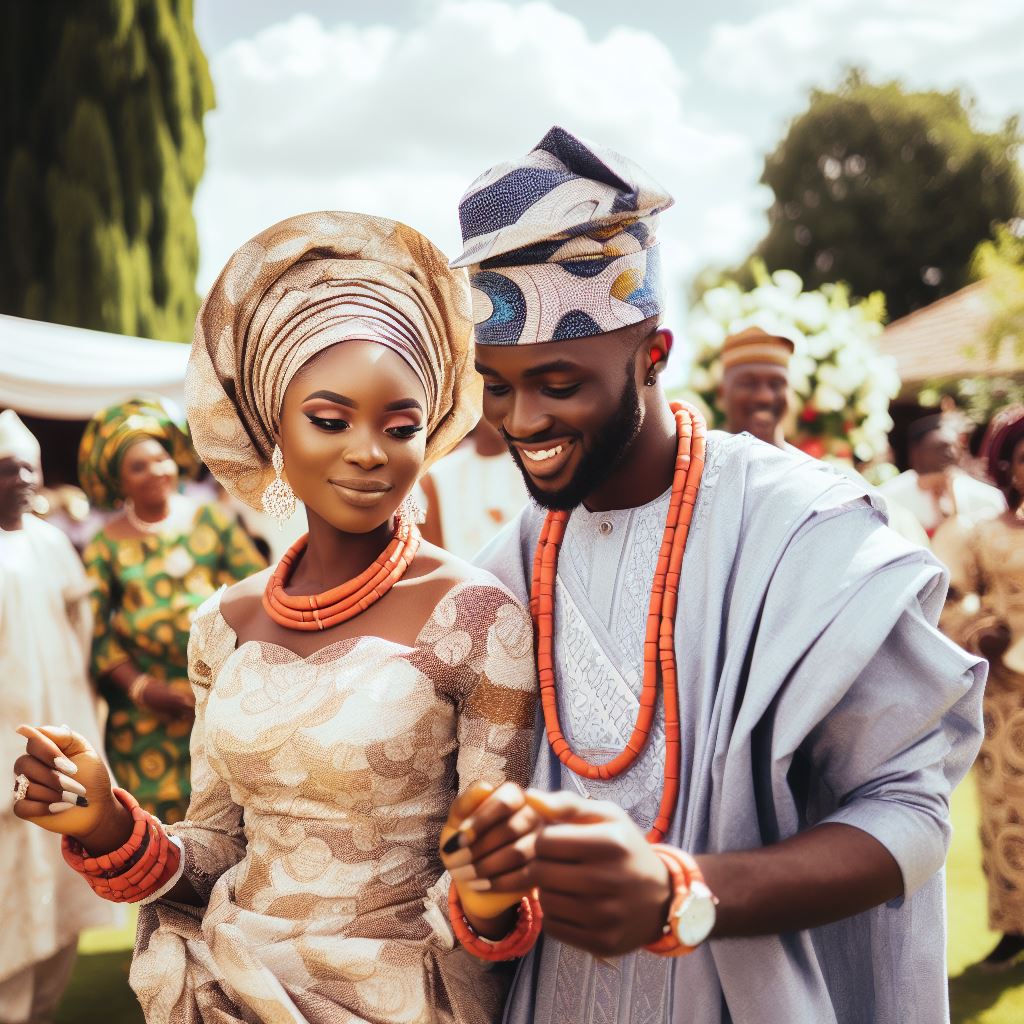
Challenges and Controversies
Gender inequality and women’s rights
- Gender inequality remains a significant challenge in Nigerian marriage traditions.
- Women often face discrimination and lack of autonomy within these traditions.
- Traditional gender roles define women as subservient to their husbands.
- This limits their decision-making power and reinforces patriarchal norms and values.
- Laws protecting women’s rights have been established, but implementation remains a challenge.
- Many argue for the need to revise traditional marriage customs to promote gender equality.
- Education and empowerment of women have become crucial in challenging these norms.
Rise of bride price and its implications
- The practice of bride price, where the groom pays a sum of money or goods to the bride’s family, has gained prominence.
- While it was originally seen as a symbol of appreciation and respect, it has become monetized.
- This has resulted in the commodification of women and created financial burdens for grooms and their families.
- In extreme cases, bride price has led to exploitation and abuse of women.
- Critics argue that bride price perpetuates the perception of women as property.
- Efforts to reform or eliminate the practice have faced resistance from traditionalists.
- Some advocate for alternative ways of showing appreciation without the transactional element.
LGBTQ+ marriage rights
- Nigeria’s anti-LGBTQ+ laws have created controversy and limited marriage rights for the LGBTQ+ community.
- Same-sex marriage is illegal and carries severe penalties, including imprisonment.
- LGBTQ+ individuals face discrimination and social stigma in their desire to be recognized in marriage.
- Activists have been fighting for the recognition and acceptance of diverse sexual orientations and gender identities.
- Progress has been slow due to cultural and religious conservatism.
- The lack of legal recognition denies the LGBTQ+ community the benefits and protections of marriage.
- International organizations continue to pressure the Nigerian government to reform discriminatory laws.
Westernization versus preservation of Nigerian marriage traditions
- The influence of Western culture has increasingly challenged traditional Nigerian marriage customs.
- Younger generations are adopting more Western-style weddings, such as exchanging rings and wearing white dresses.
- This change has sparked debates about the preservation of Nigerian cultural heritage.
- Traditionalists argue for the preservation of customs, citing the importance of cultural identity.
- Others embrace Western influences, seeing them as a way to evolve and adapt with the times.
- Balancing the preservation of traditions while embracing cultural diversity is a complex challenge.
- The evolution of Nigerian marriage traditions continues to be a topic of societal discussion and reflection.
Challenges and controversies endure in Nigerian marriage traditions due to issues such as gender inequality, bride price, LGBTQ+ rights, and the clash between Westernization and cultural preservation.
Addressing these issues requires societal introspection and a willingness to promote gender equality, human rights, and cultural diversity.
Only through open dialogue and the recognition of individual agency can Nigerian marriage traditions truly evolve.
Read: Bigamy and the Marriage Act: What Every Nigerian Should Know
Conclusion
In Nigeria, marriage traditions have undergone significant changes over the years. From the traditional tribal customs to the influence of colonization and modernization, the institution of marriage has evolved.
Polygamy, arranged marriages, and bride price were once the norms, but today, Nigerians have embraced more contemporary practices such as monogamy and love marriages.
It is crucial to understand and preserve these cultural heritage for several reasons. Firstly, these traditions hold immense historical and cultural value.
They are a reflection of the diverse ethnic groups in Nigeria and provide a sense of identity and belonging.
Furthermore, understanding these marriage customs helps foster intergenerational connection and harmony.
By passing down these traditions, younger generations can learn about their roots and ancestors, creating a bridge between the past and the present.
Preserving Nigerian marriage customs also supports the cultural economy. These traditions attract tourists and scholars interested in African heritage, contributing to cultural exchange and economic growth.
In the future of Nigerian marriage customs lies in striking a balance between tradition and flexibility.
Embracing elements of modernity while holding onto cultural values can ensure the continuity and relevance of these customs.
By celebrating and understanding the evolution of marriage traditions in Nigeria, we can cherish the richness of our culture, strengthen family bonds, and continue preserving our proud heritage.

